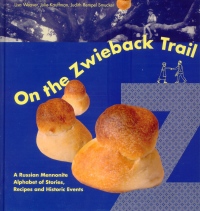| ________________
CM . . . . Volume XIX Number 5 . . . . October 5, 2012
excerpt:
The above excerpt relates a positive event in the life of Mennonite refugees at the end of World War II, but it also provides an example of their work ethic and commitment to finding ways to celebrate and be thankful for what they have. It is taken from the “P” page and accompanied by the recipe for peppernuts (Pfeffernüsse) as well as two more recipes for Pluma mos (Plümemooss) and pancakes (Pflinzen). While there are some additional recipes, this book encompasses a much broader look at Mennonite heritage than common foods. Author Lisa Weaver collaborated with artists and designers Julie Kauffman and Judith Rempel Smucker to create a unique alphabet picture book that invites you to explore the history and culture of Russian Mennonites. Pages are rich with layers of information supplied by Lisa’s text, archival and current photographs, maps, and illustrations. Each page is an artistic showpiece that invites the reader to linger and ponder all the information provided. Many pages balance historical facts with present day information. Topics range from defining Anabaptism to a “Question for the Czar;” from combined house/barn floor plans to growing wheat in Russia and the United States; from Catherine the Great to repeated waves of emigration; from a Borscht recipe to Alternative Service Work in Russia, the United States and Canada; from key tenets of their faith to sending tractors to the Ukraine; and from being known as expert farmers to baking Zwieback. A direct translation of the word Zwieback would be “two-bakes” which is an apt description for making a bun where you take one ball of yeast dough and place a slightly smaller one on top. The trick of an adept Zwieback baker is to press the small ball into the larger bottom one just enough so that it pulls apart easily (to coat in butter and jam), and yet stands up as it bakes. Novice Zwieback bakers often have theirs fall over as they bake. (The taste is still just as good.) Day old Zwieback are often roasted in the oven, ending up resembling large croutons and were traditionally taken along when travelling, hence the title On the Zwieback Trail for a book that chronicles the origin and the travels of a people in search of a homeland where they could live in peace and religious freedom. On the Zwieback Trail is not a child’s alphabet book, but it’s rather an illustrated history book that can be enjoyed by readers of all ages. The alphabet pages are followed by an illustrated timeline, detailed notes and credits, further publications and websites. This book is a great place to start to explore your own heritage or to research the Russian Mennonite culture for a school inquiry project. It is highly recommended for placement in school and public libraries and as a personal gift if this is your heritage. Highly Recommended. Betty Klassen teaches in the Faculty of Education in the Middle Years Program at the University of Manitoba in Winnipeg, MB.
To comment
on this title or this review, send mail to cm@umanitoba.ca.
Copyright © the Manitoba Library Association. Reproduction for personal
use is permitted only if this copyright notice is maintained. Any
other reproduction is prohibited without permission.
NEXT REVIEW |
TABLE OF CONTENTS FOR THIS ISSUE
- October 5, 2012.
AUTHORS |
TITLES |
MEDIA REVIEWS |
PROFILES |
BACK ISSUES |
SEARCH |
CMARCHIVE |
HOME |
